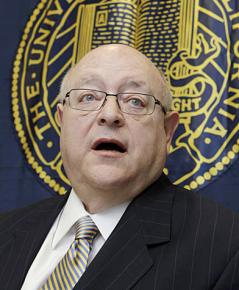Bottomless greed of UC execs
and look at the scandalous actions of UC executives.
A GROUP of top executives at the University of California (UC) have signed a letter demanding pension increases for the highest-paid administrators while students and lower-wage workers at the university face austerity measures.
The executives claim they are owed $51 million in back pensions because of a resolution approved in 1999 by the UC Board of Regents, the university system's top governing body. The resolution promised to raise pensions for administrators making over $245,000 a year, pending IRS approval.
The demand comes as UC is trying to eliminate a $21.6 billion unfunded pension obligation overall by reducing benefits for future employees, raising the retirement age, requiring employees to pay more into UC's pension fund, and boosting tuition.
Yet the signatories to the letter claim that it is "the University's legal, moral, and ethical obligation" to increase pensions for top executives--and if the regents don't agree, the executives are threatening "a costly and unsuccessful legal confrontation."

The top earners in the UC system seem to have decided that now would be the perfect time to show that their greed has no end. In the December 9 letter to the Board of Regents, they say that they "understand the current political sensitivities related to pension benefits"--translation: that the economic crisis is hammering everyone who makes less than them at UC, not to mention the students who attend the system's 10 campuses.
Nevertheless, the letter is proof that UC executives don't plan to share the sacrifices.
The executives' justification for their demand is that UC needs to pay them more like the executives of a private corporation because the university is in competition with the private sector for the "best and the brightest minds." That reveals the mentality of UC executives and Regents alike--to operate the university system more like a corporation run in the interest of executives than an institution run to serve the needs of the public.
The executives also claim that if they are forced to seek legal remedy for their claim, it "will be demoralizing to those senior employees who have devoted themselves to the University"--as if receiving compensation upwards of $245,000 per year isn't enough for them.
What's really demoralizing is the amount of money students have to pay for those executives to walk away with that much money each year.
Liberals like UC President Mark Yudof and newly inaugurated Democratic Gov. Jerry Brown are opposed to paying out the executive pensions. Last week, Brown declared, "These executives seem very out of touch at a time when the state is contemplating billions of dollars in reductions that will affect people who are far less advantaged."
However, this opposition doesn't mean that they've suddenly grown a conscience. The liberals are taking this hypocritical position because paying out millions of dollars to the top-earners at the UC would destroy the myth of "shared sacrifice" needed so the system can continue making profits by squeezing more out of working people.
STUDENTS AND workers have been sacrificing too much for too long--the past two years alone have sparked a solidarity movement between students and workers against austerity in education in the face of an overall 40 percent student fee increase over two years, and layoffs and furloughs for employees.
The solution to this problem of "shared sacrifice" is and has always been quite simple: Tax the rich.
This demand by UC executives reveals the growing need to reform how the UC is run--the system needs to be controlled by students, faculty and community members who all share a vested interest in an educated citizenry, not by fat-cat bureaucrats who are so out of touch with the needs of the people that they make outrageous claims for even more money at a time when paying for school is becoming an impossibility for so many people.
Do the executives even know what this looks like? Millions of people are watching this money grab, but are UC executives at all concerned about the indignant feelings building up among students and workers around the state? They should be.
What does all of this mean for the future of the student movement? This scandal further exposes the corruption at the heart of the university and the hypocrisy of liberal politicians who talk about sharing the sacrifice, but are really making students and workers pay.
What we need is the continued mobilization of students and workers independent of the administration and the Democratic Party. 2011 is already poised to be a powerful year in the education struggle, with a statewide day of action already scheduled to take place on March 2.
We can expect to see more disenfranchised people taking to the streets and marching to reclaim what is rightfully ours--the right to education and jobs, and an end to corporate and bureaucratic greed!


